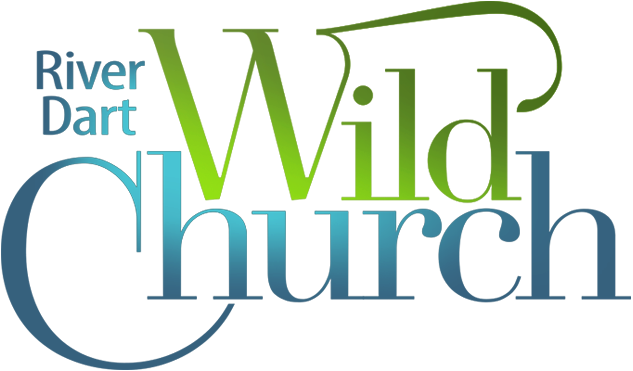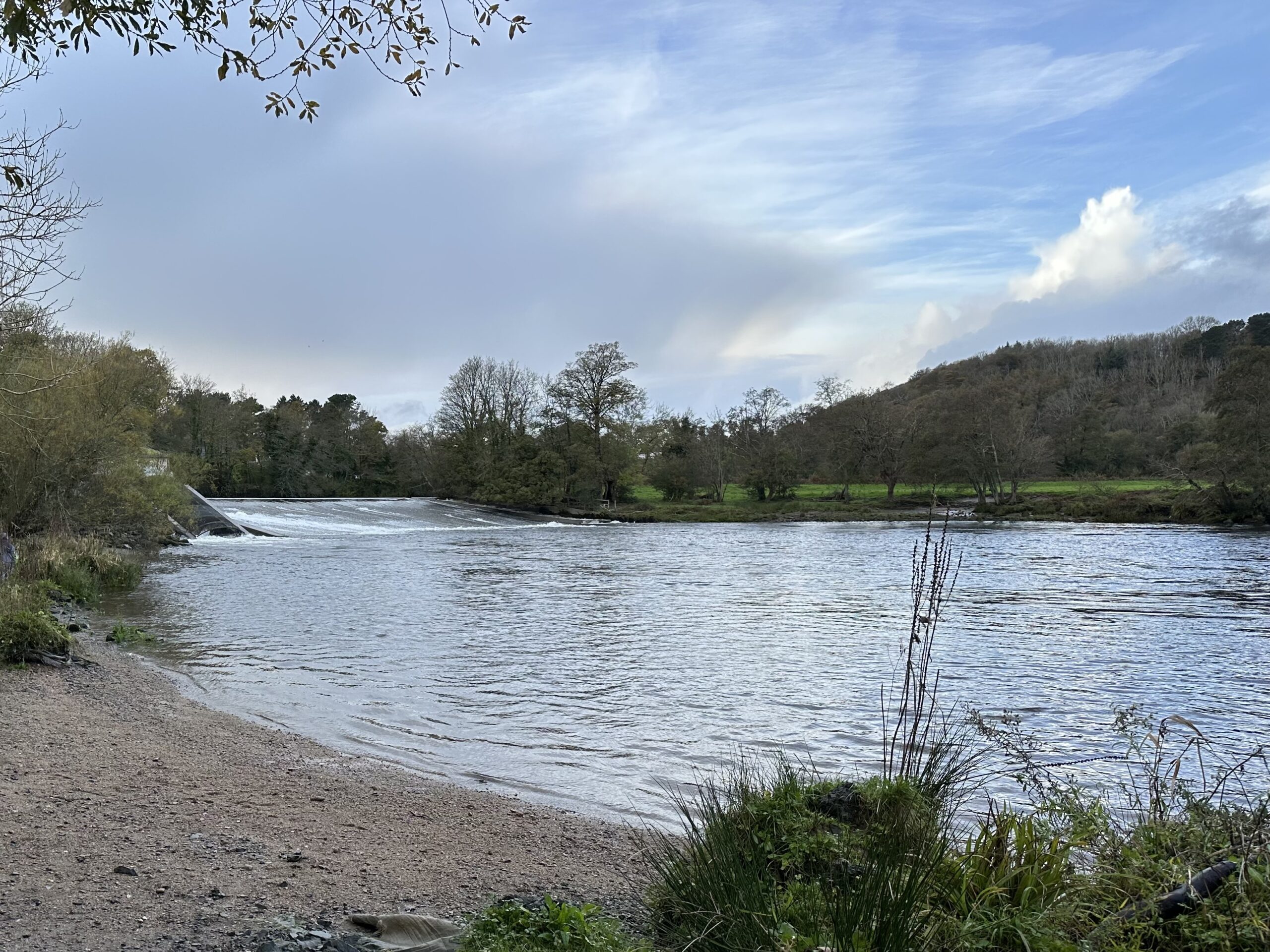The concluding walk of the saltmarsh section of our River Dart Way guided pilgrimage was in early November, on our final Wild Church Sunday for this year. It was beautifully guided by our ‘wild librarians’, Fiona & Sim, who led us from the Totnes Leechwell to the ancient yew on the Dartington Trust Estate. Read more below or click here for a brief sketch of our journey on facebook. There is also a self guided version of this stage of the route available through the British Pilgrimage Trust.
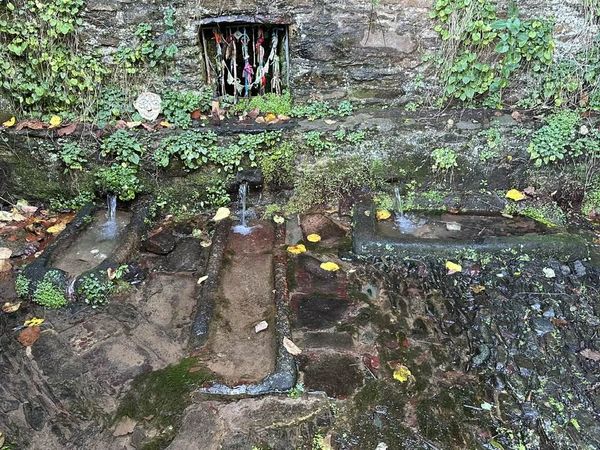
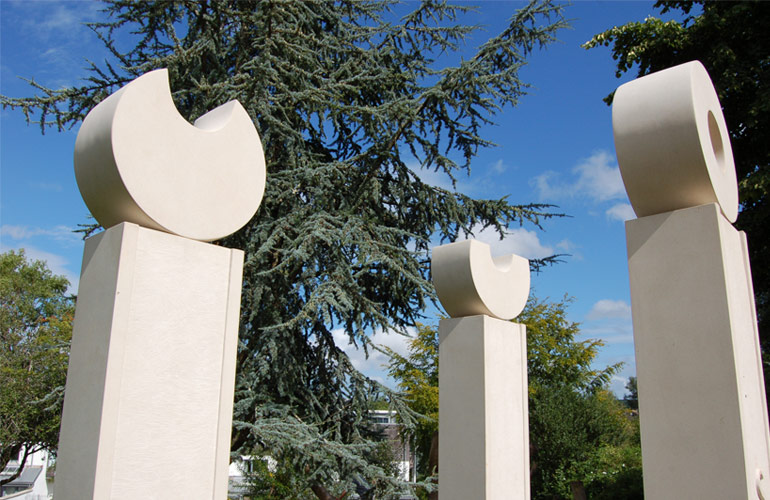
Given that our ‘sea to source’ pilgrimage started in the summer, by the mouth of the river near the sea in Dartmouth, I appreciated that we began this autumn walk by one of the many ‘sources’ of the River Dart, at the Totnes Leechwell. Since I first arrived in this area over 35 years ago, I’ve always felt that the Leechwell is an ancient, sacred and healing place and on this walk we would follow its waters down to the river and then journey upstream along the final part of the tidal reach and past the transition, at Totnes Weir, to its freshwater flow. As this was the final stage of walking the River Dart Estuary, on this first part of our river long pilgrimage, it felt like quite a special occasion and we were blessed to have two collaborators guiding us today.
Both Fiona Gibbon and Sim Taylor are professional librarians, hence our ‘wild libraries’ theme, which added another layer to contemplating sources. In planning the afternoon, the three of us had some great conversations about our love of books and equal love for the wild ‘text’ of the natural world we are all part of. Fiona got our afternoon started by introducing us to how the two can meet, for example in the Nature Library created in 2019 by Christina Riley as a reference library and reading space ‘connecting people to land, sky and sea, aiming to bring awe and wonder for the world into the everyday’. She writes:
‘The seemingly simple act of reading a book has the ability to create real change. Rather than offering an escape from the “real world”, both acts — spending time in nature and reading a book — are in fact the opposite. They demand our attention; a conscious choice to take the route into the world rather than escaping from it’.
Leading us then to Leechwell Gardens, Fiona encouraged us into a contemplative time of using all our senses to read the book of nature and so consciously take the route into the world. Then having had this time to shift into silence and become more attentive, we walked with the water as it winds its way from the triangular pool at the top of the gardens, under a bridge, through a sandy play pool, beneath the road, behind the houses and gardens of Moorashes, and back under the road to travel past Totnes library… until it emerges at Dyers Quay into the River Dart. Many of our pilgrimages are primarily country walks, so there was something rather wonderful about starting today with a town walk and there’s a kind of quiet power in being a line of silent pilgrims moving like a stream of water through busy, public spaces. Like silence, the flow of water is so often overlooked and hidden in our urban spaces and yet can still be powerfully present. The existence of the three springs of the leechwell and the deep reach of the Dart estuary are central to why people journeyed and gathered here for many centuries, allowing the town of Totnes to grow and prosper.
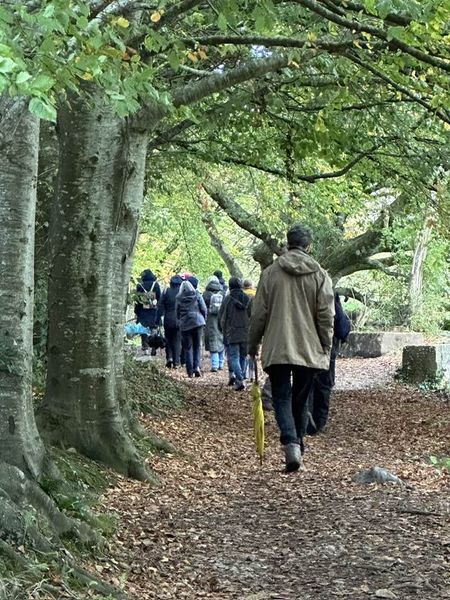
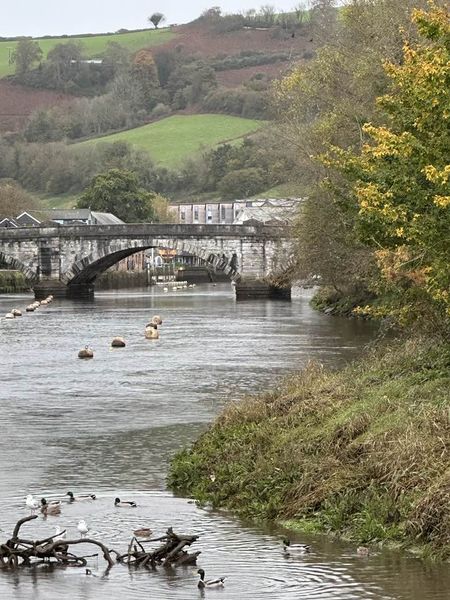
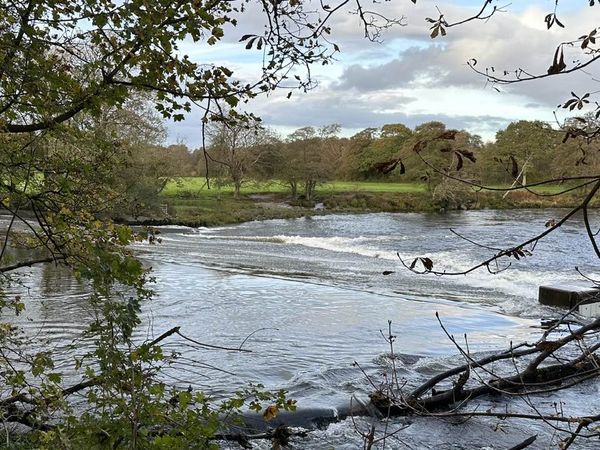
Once on the river path, we were no longer moving alongside shoppers but now with dog walkers, cyclists and even an occasional hardy wild swimmer. While in the water itself there were ducks, swans, seagulls and other waterfowl. The banks are close beside car parks and the industrial estate, yet still have their wild edges and I even spotted some saltmarsh plants, including the fluffy seed heads of sea aster. The tide was high and the water dotted with autumn leaves and occasional rain showers. It was one of those rich, autumnal days, full of changing colour and movement. Once we arrived at the weir with its noisy, powerful pulse of rushing water (as used by the TRESOC Hydro Power plant and featuring a fish pass for salmon and seatrout), we paused again for reflection. Fiona invited us to try and express something of our experience so far in words, as if writing a postcard to send home, and even provided blank postcards and pencils! To encourage us, she offered us these thoughts:
‘This ripple effect of looking closely at nature is perfectly illustrated by Eliza Brightwen, a Scottish naturalist and writer, in More About Wild Nature, her second book exploring the delights of the natural world found in and around her home:
“How hopeless a task we have set ourselves. We stand and gaze at the gorgeous sight, but how are words to tell of the lovely tones of orange, pink and crimson, in delicate streaks and flecks on a pale blue, or it may be almost sea-green sky (for a stormy sunset will sometimes suggest that colour). I am not going to attempt the task, but I would say, try to do it, if only for the increased power of appreciation of all succeeding sunsets which will be the sure result of even the feeblest attempt at word-painting. The friend will be able to conjure up from your description not perhaps the sunset you saw, but something bright and beautiful that will bring refreshment to a mind possibly very wearied with the monotony of everyday life. Sweeter still will be to her the thought that, whilst nature was giving you such exquisite pleasure, you received that you might bestow, you took thought and pains that she might be the sharer of your joy.”
She highlights that when we look closer, and importantly when we share what we see, it leads to more looking. ‘
Having reached this natural transition point at the weir, Sim then took over to guide us onto the Dartington Estate, where she works as the librarian for Schumacher College. Soon we were passing a different kind of watery mouth, where the Bidwell Brook (another Dart source and tributary), which flows through much of Dartington Parish, opens into the Dart. Sim led us into the willows to offer a different perspective on the relationship between words and landscape. Drawing on writings by Tomas Transtromer and David Abrams, she invited us to reflect on how words can replace the direct experience of the land, such that we can lose meaning and a wilder language in our preoccupation with words:
Tired of all who come with words
Words but no language
I went to a snow covered island.
The wild does not have words.
The unwritten pages spread themselves out in all directions!
I come across the marks of a rare deer’s hooves in the snow.
Language, but no words.
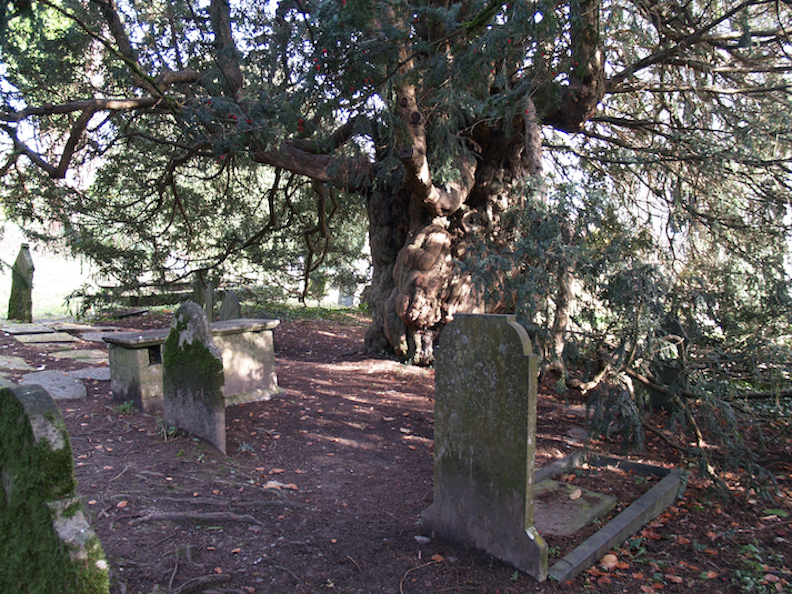
Then we followed the widening, curving sweep of the freshwater Dart, with its sudden open vistas emerging from the trees. We slipped through mud, straddled flooded pools around the stiles and there was a strange, beautiful smoothness to the high water level as it swept by us. Then turning reluctantly away from the river we made our way into Dartington Gardens, which holds another water source of its own at a well pool near the heart of the gardens. We gathered nearby under the ancient yew, shown here, which for me (as for many) is the sacred heart of Dartington. Beside her (for she is a female yew tree) stands what remains of the old church of St Mary’s. This may have begun as a wooden sanctuary in Saxon times and yet the oldest parts of the remaining tower are said to date back to the thirteenth century. The tower is currently closed but if you peep through the keyhole and look carefully, you may catch a glimpse of Mother Mary herself!
Here we gathered among the medieval gravestones for our concluding wild communion. With Mary and the ancient yew holding us in the twilight, this felt like one of our most profound and moving times of silently passing round our loving cup, as we stood together in a circle, listening to the sweet song of a blackbird. There seemed a special depth to when we then opened the silence into shared reflections, with memories, delights, griefs and tears all stirred together into our wisdom pot. Some of us then made for home in the growing darkness, while others joined Sim in the nearby Elmhirst library. Usually this is closed to the public, so we were blessed to be given a short tour and time to browse among the books with a cup of tea. What a perfect conclusion to our afternoon of wandering and wondering in wild libraries…
All text and images are my own © Sam Wernham 2023 unless stated otherwise. The image of the Leechwell guardians, sculpted by Rosie Musgrave is in the public domain here.
